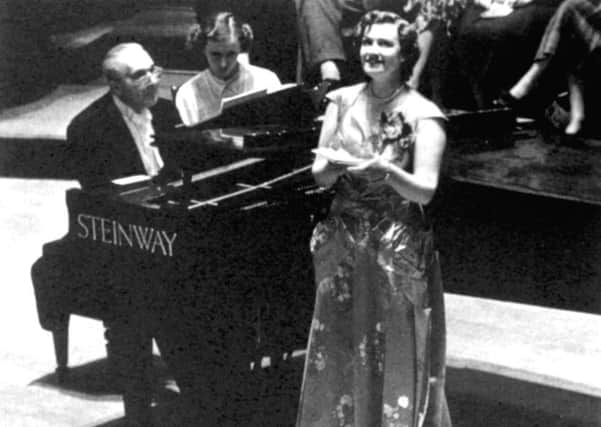Edinburgh festivals are an antidote to xenophobia – Donald Anderson


“For those of us who work in culture and literature, there is no doubt about Edinburgh’s unique capital status. It’s not for nothing that the great thinkers of the Enlightenment gathered here; or that the Edinburgh festivals were founded here and have grown in strength and international appeal ever since; or that Unesco declared Edinburgh the world’s first City of Literature. I welcome any call for investment, energy, ideas and real aspiration to develop the capital’s status for the future and for the benefit of the whole country.”
Not my words, but the words of Catherine Lockerbie, then director of the Edinburgh International Book Festival. At a point in time when xenophobia seems to be driving politics and after a dozen authors were denied visas to participate in last year’s Book Festival, it is worth reminding ourselves of the reasons why Edinburgh has its festivals at all.
Advertisement
Hide AdAdvertisement
Hide AdDuring the Second World War, Edinburgh’s council was determined to reshape and renew a city in crisis. In 1943, a ‘city development’ strategy was drawn up to tackle the degradation and economic decline throughout the city.
Shortly after, the idea of an arts festival was first hatched over a lunch in London’s Hanover Square. Opera empresario Rudolph Bing, who himself fled Nazi Austria, met leading Scottish literary figure Harvey Wood. Having considered other UK cities, Edinburgh became the preferred choice. A willing Lord Provost and city council helped deliver the aim of creating a festival that would have a special place “in the heart and home of every citizen”. The ‘Festival’ was established as a beacon of hope and aspiration in the shadow of the world’s worst war.
The Military Tattoo followed in 1950, and in the 1950s the Festival Fringe grew as a fantastic unofficial addition to Edinburgh’s cultural gem. There has always been controversy. I remember discussing the Festival Fringe with a council colleague when I was but a fresh-faced young councillor. I was aghast when he advised me that the council had actually had debates about banning the Fringe in the 1950s. Indeed, the official Festival itself was not without critics. Councillor Pat Rogan, a Labour stalwart in the 1960s, argued that councillors should not be “lackeys and lickspittles” of the Festival. Despite all that, our festivals grew and in the 1980s the first Book Festival took place. It has now become the largest event of its kind in the world. That family of festivals is one of Edinburgh’s and Scotland’s greatest successes.
I encountered controversy too and remember debating the funding of the festivals in the 1990s when council funding was cut back significantly in the aftermath of local government reorganisation.
Such cuts were justified, in part, on the basis of feedback that showed resentment of local residents towards the festivals. The council embarked on a campaign to spell out the benefits of the events to the city and its citizens, and as a result the council restored all of the funding cuts made to the International Festival over those difficult post-reorganisation years.
Controversy persists, but that original aim of securing support for the festival in the “heart and home of every citizen” has largely been achieved. It is true that not everyone believes festivals are good for the city. We know that because it is measured. Six per cent of residents think the Festivals make Edinburgh a worse place to live. That is a real concern and we should respect that. However, it needs to be balanced with the ‘whopping’ 76 per cent who think that festivals make Edinburgh a better place to live. Indeed, participation in the Festivals by Edinburgh residents themselves is at an all-time high with 67 per cent reporting that they had been to one or more festivals in the most recent survey.
And people are voting with their feet as well, with the city’s population growing by 10 per cent in the last decade and projected to grow further in the next decade as people flock to live in the city (with its festivals).
Edinburgh still faces huge issues. Growth is likely to become harder to deliver and Brexit poses challenges to both economic success and jobs. Rampant populism has driven policies that for the first time in my adult lifetime have encouraged the population to set aside the traditional ‘economy first’ priority in elections. Sadly, immigration, not the economy drove the Brexit referendum result.
Advertisement
Hide AdAdvertisement
Hide AdI love the hustle and bustle of the festivals, and fundamentally disagree with John Paul Sartre – for me, ‘heaven’ is other people. But tourism has to be managed. Airbnb poses real problems for residents – nobody’s making these issues up. Although the city centre population has increased in recent years, many homes in the city centre now operate year-round as Airbnbs. That’s not sustainable or sensible and regulation is coming which can make a huge difference in returning some normality to many areas. The ‘Bed Tax’ will also help by taking cash directly from visitors to invest it in meeting the needs of residents and businesses – what’s not to like? Edinburgh’s growing pains can be managed, so let’s make sure that happens.
Our ‘family of festivals’ is the envy of the world. Culture is part of what makes this such a fantastic place to live. And, in a time of great uncertainties, there’s an economic dividend too.
As we face Brexit, what better time to celebrate the original vision of creating festivals that embrace and nurture internationalism in the face of cheap populism and xenophobia.
Let’s celebrate a unique family of events that promote international culture and understanding and that enriches the lives of people in Edinburgh, Scotland and the World.
Donald Anderson is the former leader of Edinburgh City Council and a director of Playfair Scotland
